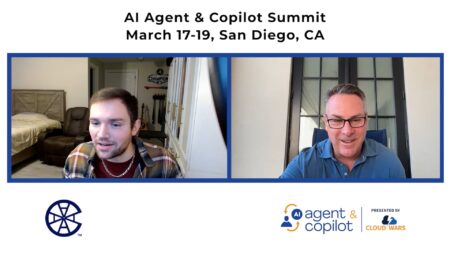
As Community Summit, an event for Microsoft business app users, draws to a close, it’s time to reflect on what was learned about the state of AI. No longer a novelty, there were many educational sessions on AI ranging from how to integrate it into supply chain to cybersecurity to sales. Here are some of the themes that emerged over the weeklong event.
Early Days for Some
The attendance at these sessions revealed that the enthusiasm was there: It was sitting-floor only at “Agents Unleashed: Mastering Declarative & Custom Agents in Copilot Studio.” However, despite these tools having been around for a while now there were still many sessions that began by reiterating the fundamentals such as the need to use clean data and the pros and cons of ChatGPT, Copilot, Gemini, and Claude.
This suggests while users may be curious about how to integrate AI into their usage of various business apps, there might be some trepidation around jumping in wholeheartedly. That might be dispelled in part by assurances that came throughout that Copilot has guardrails and should be thought of as a helpful assistant, not a possibly nefarious replacement. As Ellipse Solutions’ Senior Infrastructure Systems Engineer Ben Gefrey said in his “Copilot for Dum…Smart People“ session while walking through the capabilities of Microsoft Copilot in Azure: “It’s not going to make any assumptions before it runs something. You have final say.”

AI Agent & Copilot Summit is an AI-first event to define opportunities, impact, and outcomes with Microsoft Copilot and agents. Building on its 2025 success, the 2026 event takes place March 17-19 in San Diego. Get more details.
A Multi-Agent Future
“The future of AI isn’t a single superhero anymore: it’s the whole Avengers, a team of agents working together, said Bojan Culibrk at his “Smarter Together: How Multi-Agent Systems Are Shaping the Future of Intelligent Collaboration” session, held on the conference’s last day. The vision of a multi-agent future was woven throughout the event, with an academy class being given on crafting multi-agent AI systems before the conference kicked off and additional multi-agent focused sessions like “Multi-Agent Orchestration in Copilot Studio Using Agent Flows” and “Copilot Studio – Demystifying Multi-Agent (Focused/Connected) and Component Collections.”
The future is multi-agent because complexity has outgrown the capabilities of single-model systems. One agent trying to handle everything from customer service to analytics becomes inefficient, expensive, and brittle. Multi-agent systems, by contrast, mirror high-performing human teams: specialized, collaborative, and resilient. Each agent focuses on a distinct task, enabling faster, parallel decision-making and reducing the risk of total failure.
A Time of Experimentation, Possibility
Throughout the conference, session leaders discussed the importance of experimentation — trying things out, seeing what sticks, and learning by doing. Many shared how they’ve been using AI in their personal lives. In one session, when someone asked if Copilot could be set to automatically take notes in Teams meetings without being prompted each time, the speaker said they might as well ask ChatGPT for a step-by-step guide right then and there — a moment that captured the spirit of AI usage: curious, hands-on, and on the fly.
Others detailed significant time spent refining processes and perfecting prompts to get agents and Copilots to do exactly what they wanted. Integrity Data’s Tom France recounted his company’s experience with AI, sharing that it was an up and down journey. “Well, it started with me, our Director of Engineering, and our IT systems manager, getting some Copilot licenses, and just being intentional about using it, trying to use it to do things, more more often than not, it didn’t work, especially a couple years ago. But anytime we did have a success, we would document that success.”
Final Thoughts
There was also consensus that the time to start learning to use AI was yesterday. If that didn’t happen, it’s now. Integrity Data’s Tom France said that “AI is really not replacing jobs today, maybe a couple exceptions . . . But the thing that is interesting, and we’ve seen this, is that . . . our D/C .. more average employees, are becoming more productive, more effective in their day to day using AI than our employees that aren’t.” His comment landed like a quiet warning: those who wait risk being outpaced not by technology itself, but by the people who have learned to work with it.
Ask Cloud Wars AI Agent about this analysis








